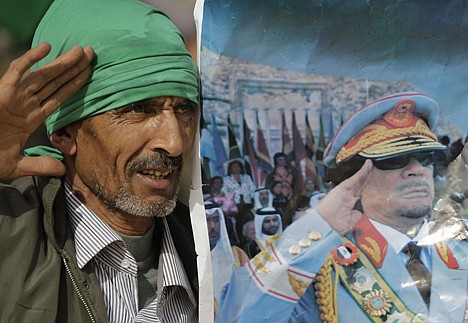Pro-Gadhafi forces fight back
TRIPOLI, Libya (AP) - International pressure on Moammar Gadhafi to end a crackdown on opponents escalated Monday as his loyalists fought rebels holding the two cities closest to the capital and his warplanes bombed an ammunition depot in the east. The U.S. moved naval and air forces closer to Libya and said all options were open, including patrols of the North African nation's skies to protect its citizens from their ruler.
France said it would fly aid to the opposition-controlled eastern half of the country. The European Union imposed an arms embargo and other sanctions, following the lead of the U.S. and the U.N. The EU was also considering the creation of a no-fly zone over Libya. And the U.S. and Europe were freezing billions in Libya's foreign assets.
"Gadhafi has lost the legitimacy to govern, and it is time for him to go without further violence or delay," U.S. Secretary of State Hillary Rodham Clinton said. "No option is off the table. That of course includes a no-fly zone," she added.
Gadhafi, who in the past two weeks has launched the most brutal crackdown of any Arab regime facing a wave of popular uprisings, laughed off a question from ABC News about whether he would step down as the Obama administration demands.
"My people love me. They would die for me," he said. ABC reported that Gadhafi invited the United Nations or any other organization to Libya on a fact-finding mission.
Gadhafi's remarks were met with derision in Washington. "It sounds, just frankly, delusional," said U.S. Ambassador to the U.N. Susan Rice.
The turmoil in the oil-rich nation roiled markets for another day. Libya's oil chief said production had been cut by around 50 percent, denting supplies that go primarily to Europe. The country provides 2 percent of the world's oil, but concerns the unrest will spread to other oil-rich nations has sent oil prices rising worldwide.
The uprising that began Feb. 15 has posed the most serious challenge to Gadhafi in his more than four decades in power. His bloody crackdown has left hundreds dead. But clashes appear to have eased considerably in the past few days after planeloads of foreign journalists arrived in the capital at the government's invitation.



